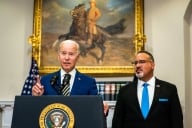You have /5 articles left.
Sign up for a free account or log in.
A House of Representatives subcommittee on Wednesday approved a 2007 spending bill that would fully finance President Bush’s budget requests for basic research programs at the National Science Foundation and the Commerce Department’s National Institute of Standards and Technology. That action, if it holds through the rest of the Congressional budget setting process, puts the House on track to pay for the entire first year of the administration’s American Competitiveness Initiative, which drew praise from academic researchers.
The House Appropriations Subcommittee on Science, State, Justice and Commerce made quick work of the spending bill for those agencies at a drafting session Wednesday. In fact, if you subtract the time that members of the panel spent praising the work of its chairman, Rep. Frank Wolf (R-Va.), who is being forced from the position after six years by term limits, the subcommittee spent all of 20 minutes discussing the actual substance of the bill.
Among other things, the legislation would:
- Provide about $6 billion for the National Science Foundation, including about $4.67 billion for research, equal to President Bush’s request and $334.5 million above the 2006 funding level, and $832 million for education programs, which is $16.2 million above the administration’s request and $35.7 million more than the 2006 amount.
- Meet President Bush’s request of $104 million for research at the National Institute of Standards and Technology.
- Restore $100 million that the administration’s request proposed cutting from the National Aeronautics and Space Administration’s budget for aeronautics research, and add $75 million to the White House request for the agency’s space science programs.
- Keep all earmarks -- member-sponsored projects for specific institutions -- out of the NASA budget. Last year, Congress’s final spending bill for the 2006 fiscal year included 317 earmarks in the NASA budget, according to an analysis by Kei Koizumi at the American Association for the Advancement of Science. Koizumi said that given what happened last year, when many earmarks got added to the agency’s budget late in the process, it is too early to assume that the NASA budget will remain free of pork-barrel projects.
Taken together with the House’s passage last month of the spending bill for the Department of Energy, the House subcommittee’s approval of the NSF and NASA research budgets puts Congress on a path to back President Bush’s goal, announced in his State of the Union, to double federal spending on basic research in the physical sciences within a decade. Wolf, the panel’s chairman, characterized the president’s push as a “welcome sign that the administration has come to terms with the crisis in American science.” And the fact that appropriators seem to be finding money to support the president’s plan at a time of generally squeezed federal budgets elates university leaders.
“We’re very pleased that the Science, State, Justice, and Commerce Subcommittee has approved in full the FY2007 funding for basic research under President Bush’s American Competitiveness Initiative,” Robert Berdahl, president of the Association of American Universities, said in a prepared statement Wednesday. “The president’s initiative is a down payment on America’s competitive future. The nation’s research universities urge the full House and then the Senate to sustain the level of support approved today.”
Added Peter McPherson, president of the National Association of State Universities and Land-Grant Colleges: “This is an important step in re-energizing our nation’s research capacity and we hope the full House Appropriations Committee will recognize the importance of the entire scientific research enterprise.”
Members of the appropriations subcommittee, in both parties, acknowledged that finding the money to back the president’s competitiveness effort “has come at a price,” as Rep. Alan Mollohan (D-W.V.), the panel’s top Democrat, described it. He and other Democrats bemoaned programs under the subcommittee’s jurisdiction that had gotten short shrift, notably the Legal Services Corporation and some local and state law enforcement programs.
But even some science programs in the panel’s terrain would suffer under its bill. Funds for the National Oceanic and Atmospheric Administration would be cut even from the president’s request, and members of both parties said they wished they had been able to add even more funds to the NASA research budget, where “the most basic earth-related science efforts continue to be squeezed out,” said Rep. David Obey (D-Wis.), the senior Democrat on the full Appropriations Committee.
“Pardon me if I don’t play the part of Charlie Cheerful this morning,” said Obey, who can rarely be accused of being a Pollyanna these days.
Rep. Jerry Lewis (R-Calif.), chairman of the Appropriations Committee, said the House was aiming to complete its work on all of its spending bills before Congress recesses next month. The science measure was the last of the 11 bills to be drafted by one of the panel’s subcommittees.









